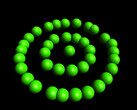Not only electrons, but also the holes or defect electrons have a spin. It has been known since 2022 that this can be used in the same way as a qubit.
However, a single qubit does not make a quantum computer. Several hundred are currently needed, which, thanks to the quantum entanglement between the individual qubits, ensure the astonishingly high computing power of such systems.
It is therefore worth noting the report from the University of Basel, in which two of these holes, or rather their spins, not only behaved like classical bits, but also interacted. This would be the step towards a quantum computer.
And because the process could be generated with a field-effect transistor, a widely used production process for transistors can be used to manufacture these components. Such metal-oxide-semiconductor field-effect transistors, known as FinFETs in particular, can be found in smartphones, among other things. These have made the construction in the low nanometer range possible in the first place.
With the "quantum gate" that has now been created, the two qubits it contains can be precisely controlled. The spin of a defect electron could be specifically reversed and was also influenced by the spin of the second hole. A response comparable to that of the classic transistor therefore seems feasible.
In addition, according to the study, the response time is in the range of a few nanoseconds. This results in a possible clock rate of more than 500 megahertz. The error rate should also be minimal.
This would not only make the production process unproblematic. The behavior of the qubits would also be fast and reliable. Sounds almost too good, but patience will be required until the Swiss quantum computer with one million qubits is actually unveiled. And wait and see whether it doesn't just end up spitting out "42" as the answer to everything.














